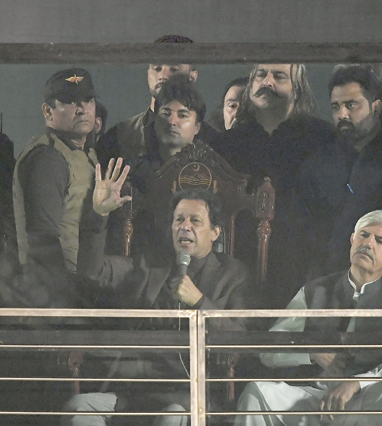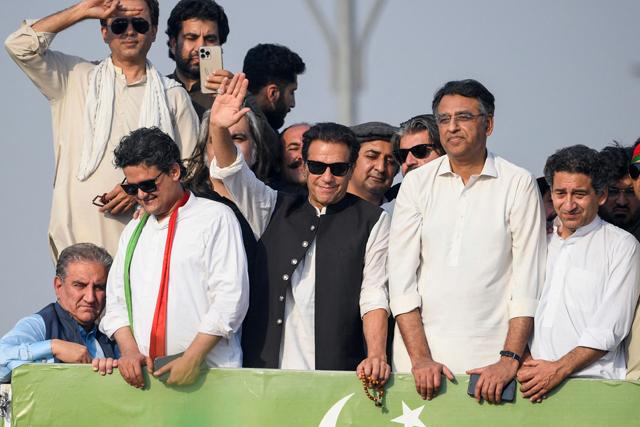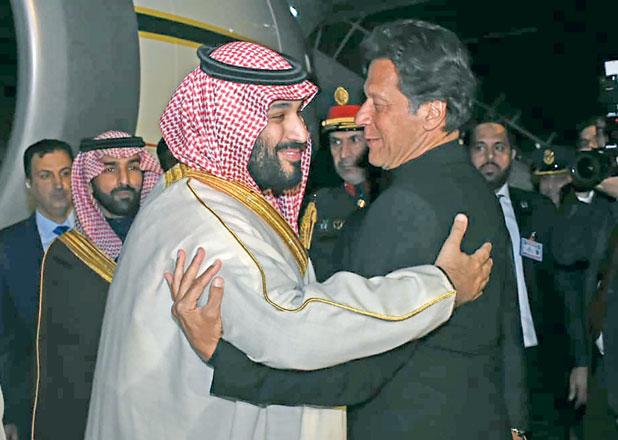You are here
Former Pakistan PM Khan vows to fight on in first rally since being shot
By AFP - Nov 26,2022 - Last updated at Nov 26,2022

Former Pakistan's prime minister Imran Khan delivers a speech behind bullet proof glass shield during an anti-government rally in Rawalpindi on Saturday (AFP photo)
RAWALPINDI, Pakistan — Pakistan's former prime minister Imran Khan told tens of thousands of supporters on Saturday he would fight with his "last drop of blood" in a first public address since being shot in an assassination attempt earlier this month.
The shooting was the latest twist in months of political turmoil that began in April when Khan was ousted by a vote of no confidence in parliament.
Saturday's rally was the climax of a so-called "long march" by Khan's Pakistan Tehreek-e-Insaf (PTI) party to press the government to call a snap election before parliament's term expires in October next year.
"I have seen death from up close," said Khan, who hobbled to the stage with a walking frame to speak to supporters from a plush seat behind a panel of bulletproof glass.
"I'm more worried about the freedom of Pakistan than my life," he told the crowd. "I will fight for this country until my last drop of blood."
The rally was squeezed onto a motorway in Rawalpindi, a garrison city neighbouring the capital Islamabad and home to the headquarters of the country's powerful military.
'Imported government'
Saghir Ahmed, a 32-year-old tailor, was among thousands arriving in the long build-up to Khan's speech atop a platform draped with banners depicting a clenched fist breaking shackles.
Having shut his shop to attend, Ahmed said Pakistan's dire economic situation, with galloping inflation and a nosediving rupee, has made life "unbearable".
"We hope Khan will introduce some reforms and the situation will improve," he told AFP.
Khan attracts cultish devotion from supporters, but on Saturday made his speech hundreds of metres from the bulk of the crowd of around 25,000 to 30,000, separated by coils of barbed wire and a buffer of police officers.
In the November 3 assassination attempt, a gunman opened fire from close range as Khan's open-top container truck made its way through a crowded street.
Buildings overlooking the site of the rally were searched overnight, a police official told AFP, while snipers were perched on rooftops surveying the mostly male supporters whipping red and green flags back and forth.
Khan himself was surrounded by a crush of bodyguards at all times, while mobile phone signals were jammed in the vicinity.
Authorities threw a ring of steel around Islamabad to prevent his supporters from marching on government buildings, with thousands of security personnel deployed and roads blocked by shipping containers.
Khan-led protests in May spiralled into 24 hours of chaos, with the capital blockaded and running clashes across Pakistan between police and protesters.
Khan told Saturday’s rally that he would not be calling on supporters to enter the capital.
‘Red alert’
Interior Minister Rana Sanaullah, who Khan accuses of being involved in the assassination plot, issued a “red alert” Friday, warning of security threats to the rally.
He listed Pakistan’s Taliban and Al Qaeda among the extremist groups that could harm Khan.
The government says the assassination attempt was the work of a lone wolf now in custody, with police leaking a “confession” video by the junk-shop owner saying he acted because Khan was against Islam.
But Khan, a former international cricket player with a playboy reputation before he married, said he has long warned that the government would blame a religious fanatic for any attempt to kill him.
Without offering evidence, Khan has named Prime Minister Shehbaz Sharif, interior minister Sanaullah, and a senior military officer of being the architects of the assassination attempt — charges they have all dismissed as lies.
Saturday’s rally took place two days after the government named a former spymaster as the next military chief.
General Syed Asim Munir’s appointment ended months of speculation over a position long considered the real power in the nuclear-armed Islamic nation of 220 million people.
Munir served as chief of the Inter-Services Intelligence agency under Khan, but his stint ended after just eight months following a reported falling out.
Pakistan’s military, the world’s sixth-largest, is hugely influential in the country and has staged at least three coups since independence in 1947, ruling for more than three decades.
Related Articles
ISLAMABAD — Pakistan's ousted prime minister Imran Khan on Thursday warned the government to stage fresh elections or face more mass protest
ISLAMABAD — Saudi Arabia's Crown Prince Mohammed Bin Salman on Sunday kicked off his tour of South Asia and China with a high-profile visit
LAHORE — Pakistan's former prime minister Imran Khan called for nationwide "freedom" protests on Sunday, after his brief arrest and detentio













